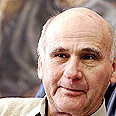
Israel is choking off its future scientists, said Hebew University's president at a ceremony in Jerusalem's Mount Scopus to honor Professor Aumann for winning the Nobel prize.
"I'm convinced that for the next ten years, Israeli scientists will be winning Nobel prizes, but they are the fruit of the investment of the last 30 to 40 years. But will there be a Nobel prize winning scientist in another 30 to 40 years? I have major doubts about that. In Israel, there is an enormous pool of scientific resources, but the State of Israel is chocking it and destroying it," warned Hebrew University President Menachem Magidor at a press conference on the university's Mount Scopus campus.
Science and Technology Minister Matan Vilnai said he initiated a program to encourage outstanding Israeli scientists and researchers to return Israel after the period of their specialization ends in universities abroad.
Vilnai's comments came as many researchers told Ynet of difficult conditions in university faculties.
Speaking to Ynet, Vilnai said, "the issue of the brain drain from Israel troubles me tremendously. It's fine that they want to learn overseas, but the problem is that they are absorbed there quickly. I've asked the head of my offices to put together a program with the relevant departments, the Ministry of Absorption, as well as the Ministry of Education, which would allow researchers to return to Israel.
Vilnai said that his aim was to raise enough funds to allow institutions to receive researchers with a higher salary, and to invest in laboratories. "At a first glance, we'll need not less than NIS 20 to 25 million," he said.
But Nobel prize winning game theory scientist, Professor Aumann, who immigrated to Israel from the United States, told the press conference, "We don't need one specific scientist or another here. If a scientist chooses to work in the United States, good luck to him. This country is for those who want to work in it, and those who have the determination, spiritual devotion, and sensitivities. I wanted to come and live here."
Aumann said that winning the Nobel prize was a big honor, but does not represent the peak of his aspirations as a scientist. "The Nobel prize is a wonderful thing, and I thank all those who wished me well, but I don't think that winning the Nobel prize is the peak of every scientist's aspirations. The peak of every scientist's aspirations is like the aspirations of every person – and that is the wish to influence. There will always be research, and students, and students of students, until the end of generations. The aspiration is to make a difference and influence the world," he said.
'Cancer is terrible thing'
Professor Aumann cried when he stood on the speaker's platform and remembered his wife, Ester, who died seven years ago of cancer.
"Rashi said that the home of man is his wife. I'm very sorry that my home is not here. My home had the biggest impact on my life. She always told me: 'You scientists can write endless articles, but most of them will be forgotten over the years. I influence the education of my children, and I too will be forgotten in another 150 years – but my influence will exist, and dozens and hundreds of children will walk around who were influenced by me.' This is actually what we scientists want – to influence and change. The prize for me is not the main issue. Of course I am not sorry to win it, it represents the fact that I reached a certain point, but the prize is not the point," said Aumann.
Understanding the essence
Aumann compared conflict resolution with finding the cure for cancer. "War is a terrible thing, and cancer is also a terrible thing. There are ways of fighting fighting cancer like chemo and surgery, but there are also other ways – and that is to try and understand how cancer works, how the cells multiply and spread. Only after we understand that can we work on a cure. And the same is true with conflicts. We first must understand what is the essence of the concept of war," said Aumann.
Professor Aumann added: "War is not irrational, it is actually the most stable thing, which has always been here. Our goal is to research its rationality and its reasons, and that's what we do in game theory. We'll only know how to solve war if we understand its essence. But it must be understood that war is not an act of madness nor is it irrational, and there are non extremist people who participate in it. Humanity has always fought – has humanity always been extremist and insane?"















